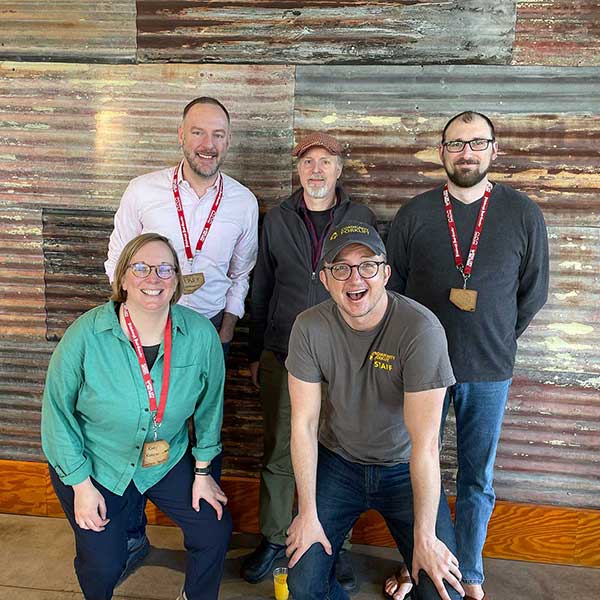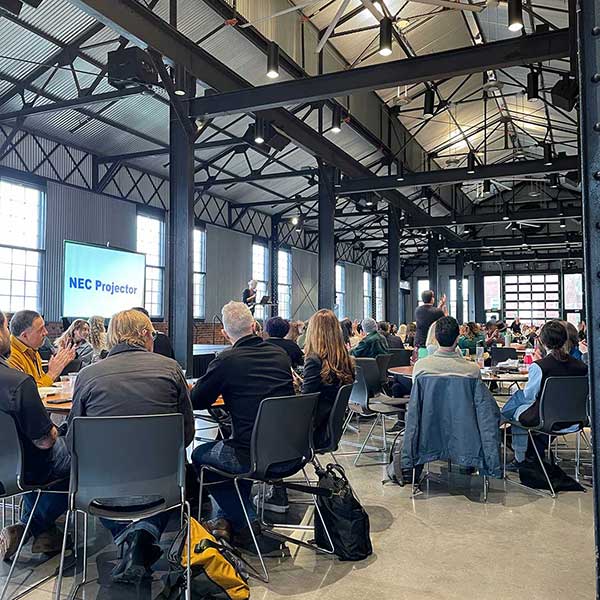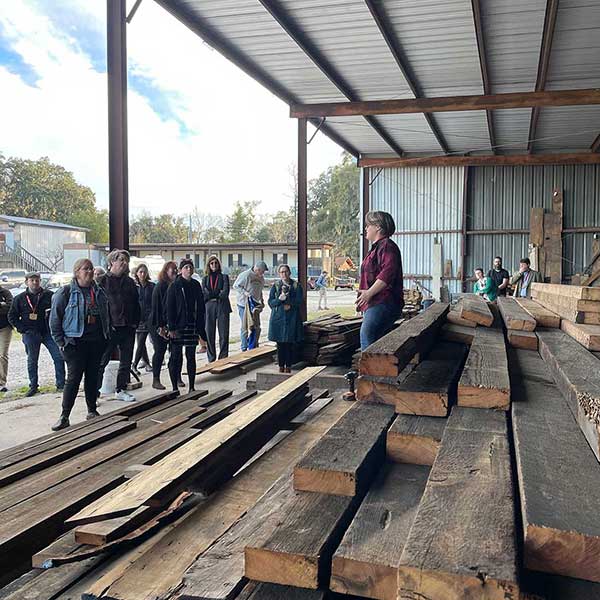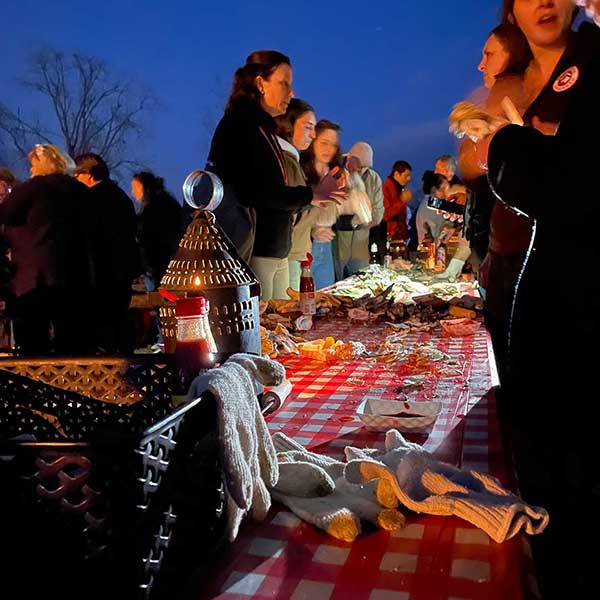2024 BUILD REUSE CONFERENCE
Five Community Forklift team members traveled to Savannah, GA, this past week to take part in the 2024 Build Reuse Conference. The annual event is the only North American conference focused specifically on reuse in the built environment. It draws policy experts, nonprofit groups, business leaders, designers, researchers, and students from around the world to discuss the current impacts of the building material reuse industry.
The Community Forklift team attended the conference to learn from peers and share some of the work that Community Forklift has been doing in the DMV area. Community Forklift’s Development Manager Katy Kutzner joined Portland, OR, nonprofit Rebuilding Center in discussing the social benefits of reuse, highlighting the positive impacts of our Community Giving programs. Community Forklift’s Director of Communications Scott Buga also presented at the conference, sharing how our nonprofit connects with community members through social media.
REUSE IS NORMAL. DEMOLITION IS WEIRD.
The conference featured a wide array of topics discussed, including case studies in deconstruction, adaptive reuse success stories, solutions for denailing lumber, apprenticeship and workforce training program strategies, reuse policies and ordinances, and much more. One theme that often resurfaced is that despite the perception of demolition being the default option in the building industry, humans have a long history of reusing materials and the relatively new idea of landfilling usable items is actually unusual.
In effect, choosing demolition results in wasting materials that are valuable historically, valuable environmentally, and valuable socially.
- Historically valuable: old growth lumber, rare woods that are no longer available, materials that are part of the fabric of our community’s built environment and culture
- Environmentally valuable: “The greenest building is the one already built” – Carl Elefante
- Socially valuable: low cost materials support a variety of businesses and help nonprofits and households with limited resources improve their spaces
NOT JUST WEIRD, BUT ALSO COSTLY
Demolishing and trashing these valuable materials not only results in the loss of all of their benefits, but also the landfills those actions create cost our communities more than just the funding needed to maintain them. Landfills are a major contributor to climate change through greenhouse gas emissions and negatively affect the communities surrounding them. The by-products of solid waste can affect heart and lung health and chronic conditions such as asthma. With minority and lower-income communities being more likely to live closer to waste sites, landfills are often closely tied to issues surrounding environmental justice for these communities.
The network of reuse-related organizations represented by the 2024 Build Reuse Conference attendees are working hard to reverse the recent trend of landfilling demolished building materials and home goods. With your support in shopping and donating salvaged materials, we can return to our roots of reuse.

Five members of the Community Forklift team attended the 2024 Build Reuse Conference in Savannah, GA.

The 2024 Build Reuse Conference featured discussions on a wide variety of topics, including case studies in deconstruction, adaptive reuse success stories, solutions for denailing lumber, apprenticeship and workforce training program strategies, reuse policies and ordinances, and much more.
Another highlight of the 2024 Build Reuse Conference was a trip to Re:Purpose Savannah for a tour of their salvaged lumber yard and an outdoor oyster roast.
“I see ‘wouldn’t it be nice’ proposals from the last in-person conference in 2019 now in action in 2024! One example is that major architecture firms have developed in-house programs with the purpose of identifying and using salvaged materials to account for the carbon footprint of their projects and meet new building codes. Additionally, while laws requiring the use of salvaged materials and accountability for carbon emissions were being discussed in some European countries in 2019, they were rare and mostly found in smaller communities in the US. They are now a reality in California (SB-253 and SB-261), Oregon, and Boulder, CO where an ordinance requires 75% of construction waste be diverted from landfills. It’s exciting and encouraging to see such progress!”
– Andrew Francis, IT & Special Projects Manager
“My takeaway from the conference can be summed up through the words of Stephanie Phillips from the City of San Antonio, an outspoken advocate and leader in the building material reuse industry… ‘Landfills don’t deserve our materials, communities do.’ To be surrounded by and to learn from folks who are deeply passionate about the ways in which reuse can positively transform our communities and protect our environment is very inspiring!”
– Katy Kutzner, Development Manager
“Reuse organizations need to get materials from the people that no longer need them to the people that do, but the transfer is hardly ever simultaneous. This requires having a physical space in which to sort and store materials between users – and the workforce to do it. Our own 40,000 s.f. warehouse serves as a waypoint to divert over 150,000 items a year from local landfills to people who can use them to keep their homes safe and functional. The math in this labor-intensive industry is such that very few organizations remain viable without securing that physical space at low or no recurring cost. It’s encouraging to see the various ways our peers approach this universal real estate challenge as we seek to secure a permanent home for Community Forklift.”
– Trey Davis, Executive Director
“It is incredible to see how far our industry has come in furthering our mission of reuse since I last attended a Build Reuse conference ten years ago. I had the opportunity this year to learn and share with peers and see the impact that past Community Forklift employees have made in Savannah’s deconstruction and preservation efforts through Re:Purpose Savannah. Our industry has taken enormous steps forward by helping to enact policy, build organizations, and develop networks across the country to divert materials away from landfills and save our precious resources. It is incumbent upon all of us in this industry to keep pushing forward as we have over the last ten years to ensure that when we look back ten years from now we can be just as proud of what has been achieved.”
– Doug Utterback, Director of Store Operations
Every time you donate or shop at Community Forklift, you’re helping us lift up local communities through reuse. We turn the construction waste stream into a resource stream for communities in the DC region – by keeping perfectly good items out of the landfill, preserving historical materials, providing low-cost building supplies, and creating local green jobs.



